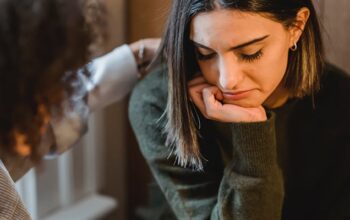Anxiety disorders are the most common mental health problem for Americans. In Arizona alone, more than 40% of adults reported symptoms of anxiety in 2021. What’s more, data suggests that number continues to rise each year. Deciding how to cope with and treat anxiety is a very personal decision and should always begin with talking to a mental health professional you trust.
It’s important to understand there are several approaches to managing anxiety and different things work for different people. For some, physical practices like working out, yoga or running help reduce anxious thoughts and feelings. For others, diet, exercise and natural supplements are most effective. There are also plenty of people who combine therapies such as medication and counseling.
No matter what you decide, you should feel empowered by taking care of yourself and prioritizing your mental health. Unfortunately, the stigma of taking medication or going to therapy still exists but the truth is, there’s nothing more important and courageous than getting help when you need it.
We talked to Phoenix anxiety therapist to learn different ways to deal with anxiety and how to make the best choice for yourself.
Anxiety Affects Every Body Differently
Though there are several shared symptoms of anxiety such as racing thoughts, trouble concentrating, rapid heart rate and breathing, it can present itself in many other ways that vary from person to person. Not only that, but some people feel anxious in social settings, or have sudden and intense panic attacks, and others can be triggered by specific things or situations. It’s a deeply personal experience and not everyone is affected in the same way.
This makes it even more important you find a type of therapy tailored to your body and the way anxiety shows up in your life. Working with a mental health professional can help you understand your symptoms, map your triggers, and come up with a plan that’s right for you.
Medication Can Alleviate Symptoms
Anxiety can be caused by a combination of factors such as genetics, brain chemistry or environmental factors. Unfortunately, the misconception is that medication cures mental illness when in reality it treats and alleviates symptoms and helps to improve quality of life. It may even give you the ability to get out of the house and take up hiking, or yoga, or see a trained therapist.
Because of this, experts agree that taking a multifaceted approach is most effective. In fact, therapy is often recommended for people who suffer from anxiety with or without taking medication. Cognitive behavior therapy, for example, is especially effective in treating anxiety because it focuses on changing the way you talk and think about certain situations to reduce getting trapped in negative downward spirals.
Other Holistic Alternatives to Medication
If you’ve decided that mediation is not right for you, or at least not right now, there is an abundance of evidence for natural and holistic remedies. In a 2016 study, for example, researchers found that long term use of Chamomile reduced symptoms of generalized anxiety disorder. Maintaining a regular meditation practice has also been known to manage anxious feelings and racing thoughts.
Taking medication is a deeply personal choice that has to be right for you. A mental health professional will be your ally and help you make the right decision and explore other safe and effective options.




